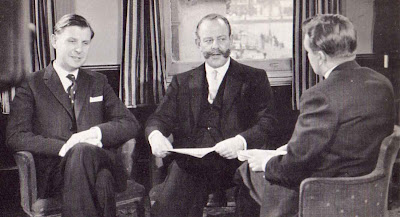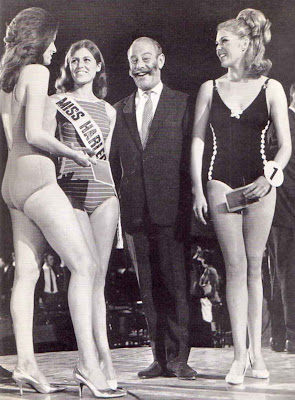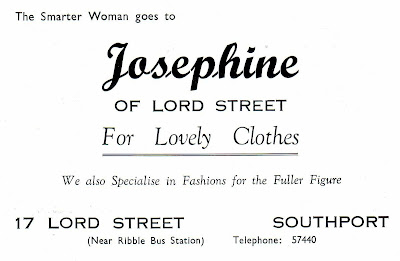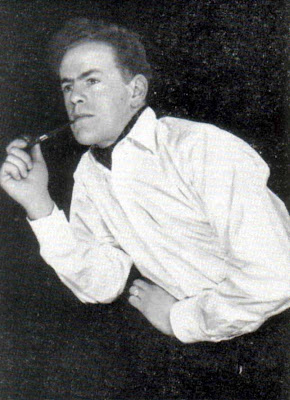I still haven't succumbed to to Twitter phenomenon. My life is far too dull to justify 'tweeting' the minutiae of my day. However, if there was a visual equivalent, I might be tempted.
I wish that I could share an image I saw this week, as I walked from Lewes Station to my house. It was twilight and if I wanted to be pretentious, I could compare the stunning, dark blue sky to an Yves Klein painting. But I wouldn't do that.
I walked past Lord Asa Briggs's house and noticed that a light was on. I stopped and saw Lord Briggs sitting in his book-lined study, huddled over a huge pile of papers. The sight of the 88-year-old scholar deep in thought, oblivious to the outside world, seemed a model of how old age should be. I wanted to capture the moment and share it. But of course, even if I'd had my camera with me, it would be crossing the line to post a photo of someone sitting in the privacy of their own home.
I had a similar crossing the line moment earlier this week, when teenage girl's diary turned up in a crate of books. Aside from the fact that it was oblong and had pages, the diary looked nothing like a book, but that didn't stop someone from donating it to a charity shop. If you keep, or have ever kept a diary or journal, be warned: an unlucky encounter with the No.9 bus could see your intimate possessions ending up in the most unlikely places.
But to return to the point, I had a teenage girl's diary in my possession. It was neither interesting nor salacious enough to warrant reading, but there were a few amusing passages that could have been worth posting. However, judging by the bad English and texting acronyms, I realised that the diary must have been written very recently. To quote even a single sentence would be crossing the line. I threw it away.
But as with copyright and official secrets, time is the great healer and I have no qualms about posting some of the things I have found this week, from photographs to personal albums:

Unusually, this photo has something written on the back:
Ros's 21st, Dec 67. This picture backs up my theory that for most people, the 1960s were more Austin Rover than Austin Powers.

A mystery photo, used as a bookmark in a 1906 publication on cake decoration called
Advanced Piping and Modelling. I have no idea where this is.

We can laugh, but how many businesses and institutions give the poorest people a 75% discount these days? During my year of unemployment, I noticed that the concessionary rates for people on low incomes were underwhelming.

It could be argued that this man did more to prevent the creation of a united Ireland than anyone else. I don't want to steal any thunder from the Catholics and Presbytarians, but Edward Carson was the driving force behind the separation of Ulster from the rest of Ireland. He had his detractors (possibly including the person who drew a moustache on this signed photo).
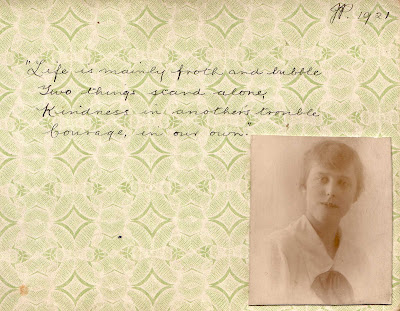
The author of this album decided to remain anonymous, but it is dated 1921:
Life is mainly froth and bubbleTwo things stand aloneKindness in another's troubleCourage in our ownThe quote is unattributed, but I have discovered that it is by the so-called national poet of Australia, Adam Lindsay Gordon.
This page is more intriguing:

If to dream of you by night
and think of you by day:
If all the worship wild and deep
that woman's heart can pay,
If prayers in absence breathed
for you to Heaven's protective power;
If winged thoughts that fly to
you a thousand every hour
And imagination blending you
with all my future lot -
if this you call forgetting - then
indeed you are forgot...

Who is Lallie Charles? It seems that she is not the beautiful woman in the photograph, because Lallie Charles was the name of a photographic agency, established by an Englishwoman who was born in 1869.
Is the poem an original work? Has it been written as a love poem to the mysterious woman in the photograph? Is this woman a famous actress, or an intimate acquaintance? We will probably never know.
I have presented a series of random images, but I always feel as if there has to be a point to it all, so I usually end with some platitudinous epigram about time passing. Today I'll end with a quote:
"Sometimes I feel that life is passing me by, not slowly either, but with ropes of steam and spark-spattered wheels and a hoarse roar of power or terror. It's passing, yet I'm the one who's doing all the moving." - Martin Amis
 Last week's local paper's classified ads section had several books for sale. One was a 1936 road atlas, on sale for £25. I presume that the instigators of this advertisement were operating on the premise that if it's old, it's worth something. But this isn't the case. You can buy a beautiful 1850s collection of Wordsworth poems for under a tenner. It's all about supply and demand.
Last week's local paper's classified ads section had several books for sale. One was a 1936 road atlas, on sale for £25. I presume that the instigators of this advertisement were operating on the premise that if it's old, it's worth something. But this isn't the case. You can buy a beautiful 1850s collection of Wordsworth poems for under a tenner. It's all about supply and demand.










